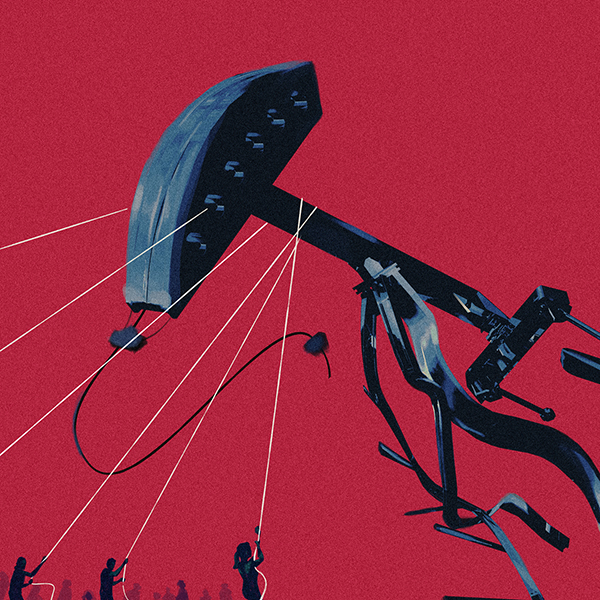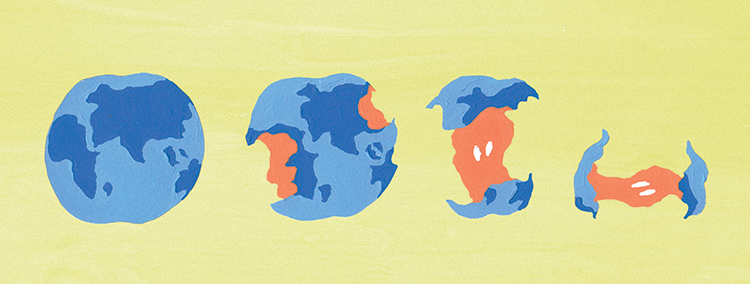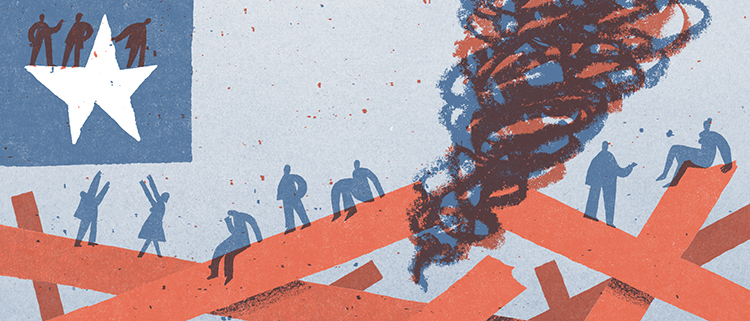Illustration by Corey Brickley
Learning to Forget
interview by Heather Shayne Blakeslee
It’s unlikely that any particular college degree would prepare you to become a “futurologist.” But that’s exactly what polymath Jack Uldrich calls himself. His breathless recitations of game-changing inventions and ideas that entrepreneurs and environmentalists should be on the lookout for run the gamut —from wearable tech and battery storage to agricultural disruptions like “superwheat” and “real vegan cheese.” This summer, the eternal optimist will take the stage at the Energypath 2016conference at Penn State to give a keynote address on the future of energy efficiency. But what Uldrich most wants his audiences to consider is how forgetting what we know can open us up to what he calls the “predictably unpredictable” future.
The daily news is pretty bleak, but you are an optimist.
JU: I totally believe that climate change is a real and serious issue, and our energy sources today are a leading contributor to it. … But when I look at the future, I really see the ability for cheap, clean, affordable and sustainable energy. Not just solar… there are going to be continued advances in wind power, in tidal power, in geothermal. But from my perspective, I’m really most excited about two things: first, the continued advances in battery storage technology, which are going to enable solar and wind and other distributed energy sources to become that much more effective. And then longer term, although it’s been dismissed as pie in the sky, there’s some startling advances happening in the area of fusion energy—the ability to essentially create a mini-sun in a bottle here on Earth and have an unlimited source of clean, sustainable energy.
How far away do you think we are from achieving a vision of a world economy run on alternative energy?
JU: I would say 10 to 15 years. Ten, optimistic. Fifteen, from my perspective, is solidly within the realm of possibility.
How do you think we’re going to get there? What, politically or otherwise, couldget in the way?
JU: There’s always the issue of the current incumbents. The people who are making money off of today’s energy sources, be it petrol gas, coal, nuclear—although I would argue that nuclear is a clean source of energy; whether it’s safe, that’s another issue. But they’re going to use their political power and influence to try and slow down the development of a lot of these technologies. They’re not going to be successful.
So, if we make fusion happen, we essentially have a renewable, mini-sun. That’s not possible for things like the minerals that we use for our cellphones, for our computers. How do we behave in ways that still pay attention to resource constraints even as some high-growth tech companies are trying to put a fitness device on everybody’s wrist?
JU: I think the perfect example is what’s going to happen with battery technology. Battery technology has these wonderful possibilities of helping sustainable energy take off, in the sense that we can suddenly store solar power and use it even on cloudy days, or use wind power on windless days. But battery power is not without significant environmental issues—the minerals, as you alluded to. So, I think the answer in part is going to become, how do we become smarter in using these technologies that do deplete our natural resources? … I think it’s the old mantra of reduce, reuse, recycle.
I can see things like net-zero buildings or self-healing materials or other smart materials really helping us to reduce our energy consumption—buildings are the biggest consumers of energy around the world, and as the population grows we’re going to need more of them—but does that just teach us to keep consuming? In what way does behavior have to change at the individual level?
JU: We’re so focused on scarcity, and that is our mindset. But frequently what the future tells us is: It’s not scarcity that’s the problem, it’s abundance that’s the problem. So, in the 1930s, the world is going through a depression, food is scarce. It would have been hard for most, at least Americans, 80 years ago, to imagine the greatest health care problem today would be not starvation—but obesity. Why? It’s because food—you can argue it’s unhealthy food—food has become abundant, and that’s brought a whole host of other issues. We’re on a mindset today of saying that we do have to conserve—and I think that’s the right thing to do—but if we really do get energy from cheap, clean, sustainable, affordable energy sources, we can use an unlimited amount of energy without negative impact to the environment and the world.
You believe that the future will be built on us “unlearning.”
JU: Historically, growth has almost appeared linear, and that change took place relatively on a predictable, linear pace, and so it was easy to plan, and you could do it on 10-, 20-year cycles. But in today’s era of accelerating change, the world is changing really fast, but people don’t change as fast. And so what they learned early in their career, early in their education, rapidly becomes obsolete… If we want to embrace the future, we’re going to have to focus as much on unlearning as learning.
And I think the best recent example, that’s not related to energy, is Uber. Just think about that—that company could not have existed eight years ago. Cloud, mobile social technology—they all existed but they hadn’t yet scaled to a point where you could use your smartphone to identify another person with a car who would be willing to give you a ride at half the price of a taxi. And yet, in five years it’s decimated the taxi industry, it’s changing the automotive industry, it is changing how many people think about ownership. … The taxi industry needed to unlearn, the automotive industry needed to unlearn, and now consumers are needing to unlearn their behavior. And then the insurance industry is having to unlearn their business model—they’re like, ‘Oh, my gosh. If not everyone owns a car, they won’t need as much insurance. So what are we going to do?’ So, this is going to happen everywhere.
You have talked about tapping into the knowledge of masses of individuals as a way to solve certain problems, rather than relying on the genius of one individual.
JU: There’s a really wonderful author, his name is Clay Shirky, and he wrote a book and he said, ‘Look, Wikipedia took 180 million hours to create. That sounds like a lot of time, doesn’t it?’ And it is a lot of time, but he said, ‘Here’s another way to think of 180 million hours: It is the amount of time Americans are going to spend watching TV commercials—this weekend.’ So, his point was, millions of people dedicating just small fractions of time created something really powerful… To have millions of people slightly shifting their behavior to consume less energy, or to address some world problem is going to be a real possibility. And it’s why I’m optimistic about the future.
How do you think our education system is going to have to change in order to prepare for the new economy?
JU: I’m going to sum it up for you in seven words: Give up on answers, stick with questions. What we can’t afford to do is educate our children for a future that no longer exists. We can’t pretend to give them answers as to the idea that we know what the world of 2025 or 2030 is going to look like. So how do we navigate that? We have to stay curious, and we have to continue to teach our kids how to think crit
ically, how to ask better questions, how to assimilate different ideas, how to see the world from a different perspective, how to challenge their assumptions. So, I think the whole paradigm of education has to change.
We focus on STEM fields at the expense, sometimes, of the humanities. Do you think the humanities will have a resurgence, given that those disciplines ask questions more than look for specific answers?
JU: I think that’s right, and it’s not to minimize STEM, but it is to say we do have to go back to liberal arts education. We need to teach people how to think critically, ask better questions, keep an open mind, have a growth mindset. And I think that those countries that are able to do that are going to be better positioned for the future. … We need to be able to have the flexibility and adaptability to both be prepared for whatever comes next and to help create innovative solutions that create the world that we all want to live in.
Jack Uldrich is an author and global futurist who will be the keynote speaker at Energypath 2016, July 25–29 at Penn State.







